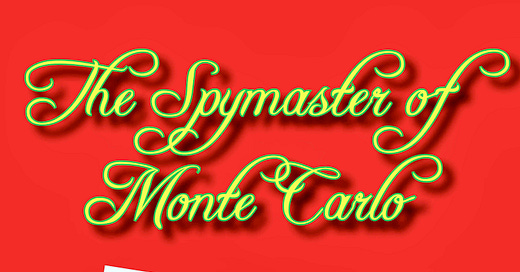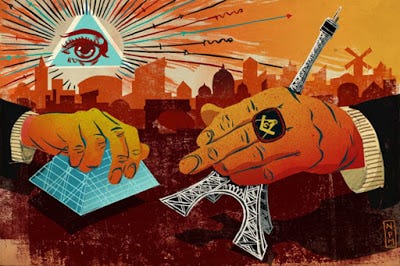Autumn 2003
On October 1st, Prince Albert phoned me to confirm a meeting two weeks later, and he graciously invited me to join him at the World Music Awards in Monte Carlo.
I welcomed this as an excellent opportunity to observe the social dynamic of a modern royal court.
I once told Albert that he resides in the eye of a hurricane, with social climbers, hangers-on and brown-noses forever swirling around him, all trying to jostle one another out of position in an ongoing contest of Who can be nearest the prince.
All the usual suspects had tables in sectioned zones adjacent to the prince’s own table in the center, including British billionaire Philip Green, Irish packaging tycoon Michael Smurfit, and Omar Masoud, the Libyan vice-president of Tamoil.
Not content with his placement, Green actually left his table and postured himself in the prince’s section, standing, gazing around, perhaps to ensure recognition of himself in close proximity to the prince—a mental condition known among Monaco insiders as Albertitis.
Noticeably absent: Alexey Fedorichev, who seemed to understand his exile from the royal court, along with another Monaco resident the prince effectively banished from his court due to our reveals.
Next day, the prince and I met in Hotel Columbus for 50 minutes during which I updated him on various matters.
Samy Maroun, Albert told me, was still trying to put him together with Patric Maugein, saying things like, “He is close to Chirac” and “He has ideas for better business in Monaco.”
The prince said he rebuffed Maroun, so I felt confident our service to him was working to his benefit.
“By the way?” I asked. “What was Philip Green doing in your section at the music awards?”
“Yeah, I know,” replied the Prince with a look of disdain.
November-December 2003
In early November we learned that Prince Albert’s senior aide-de-camp, Bruno Philipponnat, was instigating a plan for Albert to visit Azerbaijan.
By this time, we knew Philipponnat was abusing his position by befriending the prince’s personal friends.
The danger, it seemed to us, was that the prince’s personal friends—in association with Philipponnat—would use access to Albert for the purpose of making business deals, from which they stood to profit, and from which Philipponnat would also profit financially.
In this instance, we looked at two friends in particular with whom Philipponnat had become close:
Robert Munsch, an optometrist from St. Louis.
Preston Haskins, a Moscow-based businessman from Texas.
Munsch was overheard to say (in the Bar Americaine of Hotel de Paris) that he needed to “get Albert to Azerbaijan” so he could make "a lot of money in an oil deal."
Thus, when I next met the the prince, on November 21st in Hotel Columbus, I had some questions:
Would it bother you if close personal friends of yours were making money through taking advantage of their relationship with you?
Would you want to know about it?
Would it bother you if persons in your employ abused their positions to receive commissions, kickbacks or silent partnerships?
Would you want to know about it?
Albert answered yes to all.
Thus, with the prince's explicit permission, we added Messer’s Munsch, Haskins and Albert’s own senior aide-de-camp to our ever-widening radar screen.
Meanwhile, a division chief from MI6 arrived in Monaco after requesting a meeting.
This time MI6 tried a different tactic in their strategy to cut around the middleman.
Could the prince, they asked, introduce them to the head of the Monaco Banking Association?
The prince irresponsibly countered by suggesting they instead be introduced to Monaco’s finance minister, and he offered to arrange an introduction.
Soon after, I derailed this, believing it inappropriate to allow a foreign intelligence service to cultivate a government minister or high-level source within Monaco’s banking system.
The prince concurred with my reasoning and authorized me to convey the following to MI6:
“We have devised a more appropriate, more effective system for dealing with your requests. You make known to me—RE—what specific information you are looking for. If we feel such information can be shared with you, the prince will request such information from the relevant official and I will pass it on.”
I saw the division chief from MI6 out and, minutes later, ushered in Bill Murray from CIA.
Murray offered the prince briefings on any country Albert expected to visit and also invited him, and me, to visit CIA headquarters for briefings by various experts on money laundering and terrorism finance.
After Murray departed, my deputy and I conducted a comprehensive briefing for the prince on members of the Pastor family, locally known as “the second most important family in Monaco.” He had requested this a month earlier.
Before we adjourned, Albert broached a subject that he announced to be of deep concern to him: The influence of French Freemasons in Monaco’s government and police department.
Albert was particularly troubled by the notion that promotion within the principality’s government ministries and police department was being based not on merit but on Masonic membership.
He explained that he recently declined an invitation to a Freemason event in Cannes.
I concurred with the prince’s wisdom, recommending that, as royalty, he should remain above the fray, and stay free of any such attachments.
An investigation of French Masonic lodges became our next requirement.
Afterward, I lunched at Quai des Artistes with Bill Murray
He confirmed that Freemasonry was a powerful influence in France.
And he told me the FBI had finally gotten active on MING—but only after he, Murray, offered to take it off their hands and run it as an intelligence operation instead of a criminal investigation.
I wish he had.






